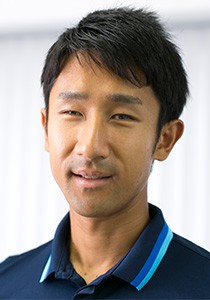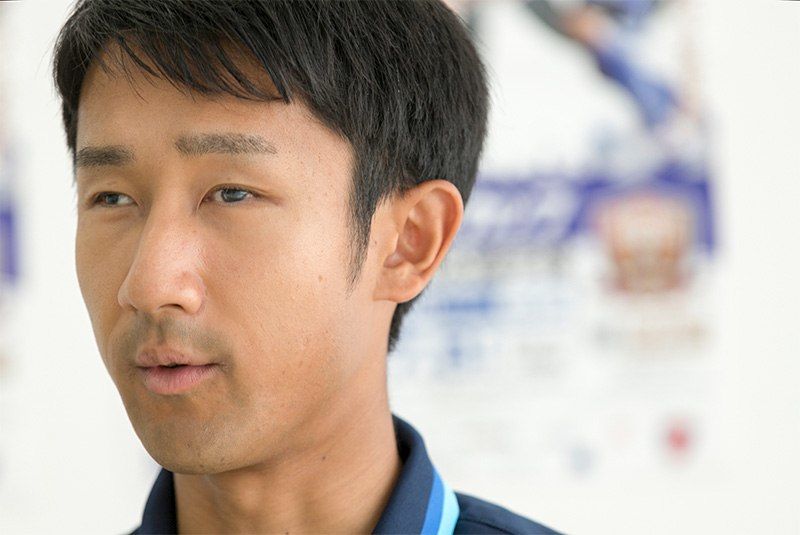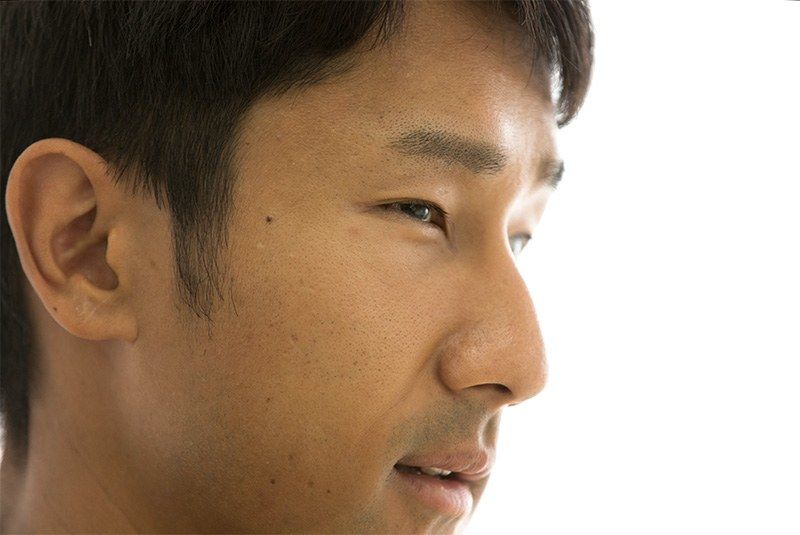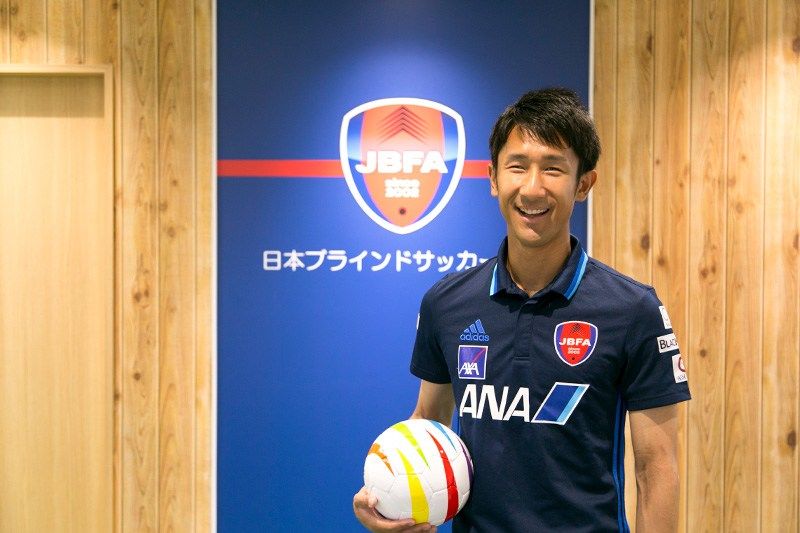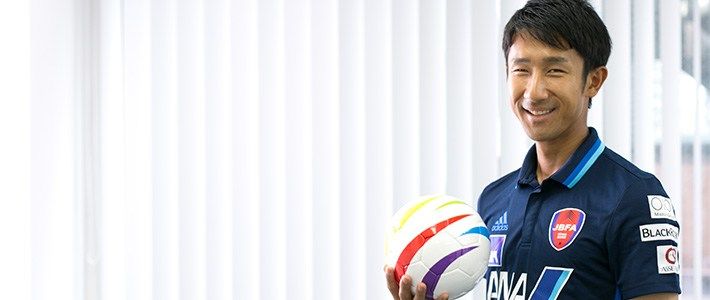
Paralympic Athletes, Up Close and Personal
Kawamura Ryō: Leading Japan to Gold in Blind Soccer
Sports Tokyo 2020 Society- English
- 日本語
- 简体字
- 繁體字
- Français
- Español
- العربية
- Русский
Listening in Three Dimensions
Kawamura Ryō has an astute, expressive way of conversing that leaves a listener wondering if he really is blind. The captain of Japan’s national blind soccer team, Kawamura chalks this impression up to his adeptness in responding to sounds and people’s voices, a skill he honed on the field. Grinning, he says, “I can clearly see in my mind where a person is.”
Blind soccer is similar to its mainstream cousin in most respects—teams attack and score while defending their own goal—but with several key differences. First of all, matches take place on a smaller pitch, 20 meters wide and 40 meters long, bordered by 1-meter-high kickboards running the length of each touch line that keep the ball in play. Games are shorter, consisting of two 20-minute halves, and are played using a ball that makes noise when it rolls. Each side has five players—four field players and one goalkeeper—in addition to a guide positioned behind the opposing goal who gives instructions on where to direct shots, and a coach who provides directions from the side line. Field players are completely blind (eye masks are worn for fairness as some players may be able to sense light), and goalkeepers may be partially or fully sighted.
Japan has never qualified for the Paralympics in blind soccer, but thanks to a host country allocation the national team is looking to make the most of its Paralympic debut at the Tokyo Games in 2020. The squad missed out on Rio in 2016 with a disappointing fourth-place finish at the 2015 Asian Championships. However, a subsequent reshaping of the national team in 2016 placed ace Kawamura in the pivotal role of captain, and has raised expectations for the team in the runup to the competition.
Dethroning Brazil
Standing in the way, though, is Brazil. Unsurprisingly, the Brazilians dominate blind soccer, and have claimed every gold medal since the sport debuted at the Athens Paralympics in 2004, a situation that brings a stern look to Kawamura’s face.
“To be honest,” laments Kawamura, “we are nowhere near being in the same league as Brazil.” However, he remains optimistic about Japan’s abilities. “I think we could win one out of ten games against them. Right now the team is working hard to make that one time be in Tokyo.”
Some may dismiss this as wishful thinking. Not only does the squad lack Paralympic experience, but in March of this year it finished a dismal fifth out of six countries at the International Blind Sports Federation’s Blind Football World Grand Prix in Tokyo. Kawamura insists, though, that with Tokyo on the horizon in 2020 the team’s momentum is shifting in a positive direction. “Japan has built up a lot of experience,” he explains. “And our play reflects our hunger to score goals.”
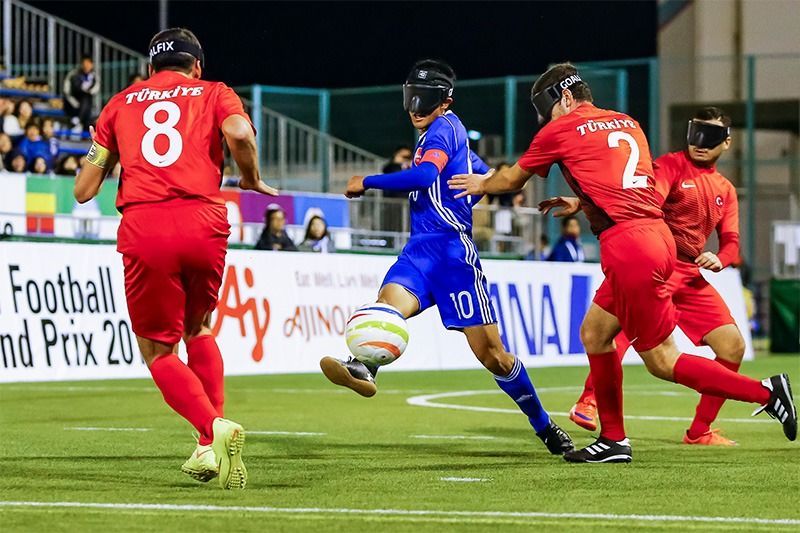 Kawamura takes a shot in a match against Turkey at the IBSA Blind Football World Grand Prix 2018 in Tokyo. (Courtesy of the Japan Blind Football Association)
Kawamura takes a shot in a match against Turkey at the IBSA Blind Football World Grand Prix 2018 in Tokyo. (Courtesy of the Japan Blind Football Association)
There is reason to believe Kawamura is correct in his assessment of the national team. At the Carolo Blind Football Cup, a friendly competition held in Belgium in May of this year, Japan defeated Asian powerhouse Iran for the first time in nine meetings. The victory was notable in that Iran, who used the tournament as a warmup for its campaign at the World Championships held in June, was in top condition. Japan also beat a mixed German side and Belgian pro team SC Charleroi to win the tournament. Kawamura lead the way for Japan, scoring eight goals and earning the Golden Boot.
Training the Mind and Hearing
People seeing blind soccer for the first time are often surprised by the intensity of matches and the precision with which players dribble, pass, and shoot. Kawamura and his teammates, though, do not consider blindness an obstacle to playing soccer at the same level as completely sighted players.
“Using only my hearing doesn’t affect how I play in the slightest,” he exclaims. “I can hear where other players are on the pitch just as clearly as if I could see them.”
He points out, though, that he has had to train hard to build up his auditory abilities to the level where he can accurately visualize the playing field. “Sound carries a lot of information, but you have to be attuned to what it is telling you,” he explains. “I practice constantly on broadening my spatial awareness, for example by pinpointing where a person’s voice is coming from and working out details like distance and whether they are standing or sitting.”
Kawamura often finds himself compared to Brazilian striker Ricardo Alves Pereira, a talented dribbler and key factor in his country’s four straight Paralympic golds. Pereira once underwent a brain scan as part of a Japanese television program that showed how his speedy footwork and ball control were linked to his exceptional sense of hearing and spatial perception. The show concluded that Pereira had repurposed his visual cortex to process auditory information in a unique way, giving him a competitive edge on the field.
Although Kawamura plays down the comparison with Pereira, he was fascinated by the program’s findings, making him more focused on knocking Brazil off its pedestal. “Having seen it from a scientific perspective, I now realize that the brain is capable of much more than I ever imagined,” he says. “Winning a medal in 2020 is a lofty goal, but I’m convinced that setting the bar high is the only way to evolve and improve as an athlete.”
Enjoying the Ride
Kawamura was born in Higashiōsaka in Osaka Prefecture. At the age of five he contracted uveitis, an inflammation of the middle layer of the eye, that damaged his vision. He played soccer all through elementary school and even harbored boyhood dreams of becoming a pro. But after entering junior high school he reluctantly switched to track and field at the insistence of his parents and homeroom teacher, who felt there was less chance of him getting injured. He competed as a middle-distance runner up through high school, and although he says he did not enjoy it, he admits that running gave him the strong legs that serve him so well on the pitch now.
Kawamura says that he benefitted from a supportive environment in high school, recalling that his teacher even paired him with better students in the class who would help him read and understand material. After graduating he entered Tsukuba University of Technology, where he studied Oriental medicine. While at the university he began playing futsal for visually impaired participants. But after seeing national team player Tamura Yūichi play on an adjacent pitch, he decided halfway through his freshman year to switch to blind soccer.
“I was amazed at how easily he cut through the defense and beat the keeper even though he had a mask covering his eyes,” Kawamura recalls. “It was a major turning point for me. I decided at that moment that I wanted to be able to play like that.”
Kawamura says playing with an eye mask on was a frightening proposition at first. Being diagnosed with total blindness in 2013, though, strengthened his resolve to pursue blind soccer. After graduating from university he joined AXA Life Insurance as an acupuncturist while continuing to train.
Even though his skills have made him a key player for the national team, Kawamura insists there remains ample room for him to develop as a player. “I’m only half way to where I want to be by 2020,” he says, adding that the challenges laying ahead leave him breathless with excitement. “We’re traversing uncharted waters. Whether we stand atop the medal podium comes down to the training we do over the next two years.”
(Originally published in Japanese on July 11, 2018. Photos by Kawamoto Seiya, except where noted.)
